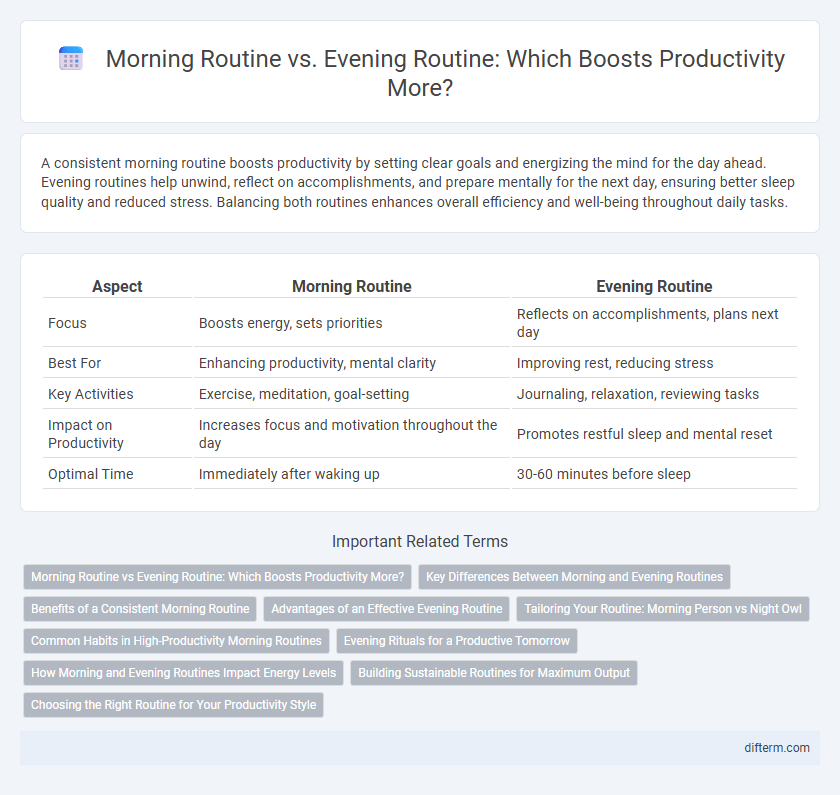A consistent morning routine boosts productivity by setting clear goals and energizing the mind for the day ahead. Evening routines help unwind, reflect on accomplishments, and prepare mentally for the next day, ensuring better sleep quality and reduced stress. Balancing both routines enhances overall efficiency and well-being throughout daily tasks.
Table of Comparison
| Aspect | Morning Routine | Evening Routine |
|---|---|---|
| Focus | Boosts energy, sets priorities | Reflects on accomplishments, plans next day |
| Best For | Enhancing productivity, mental clarity | Improving rest, reducing stress |
| Key Activities | Exercise, meditation, goal-setting | Journaling, relaxation, reviewing tasks |
| Impact on Productivity | Increases focus and motivation throughout the day | Promotes restful sleep and mental reset |
| Optimal Time | Immediately after waking up | 30-60 minutes before sleep |
Morning Routine vs Evening Routine: Which Boosts Productivity More?
Morning routines enhance productivity by aligning with natural circadian rhythms, promoting alertness and focus through activities like exercise, meditation, and planning. Evening routines facilitate reflection and mental reset, supporting rest and preparation for the next day, but tend to impact productivity indirectly by improving sleep quality. Studies show that a structured morning routine directly boosts cognitive performance and task efficiency more significantly than evening routines.
Key Differences Between Morning and Evening Routines
Morning routines boost productivity by activating cortisol levels, enhancing alertness and cognitive function, while evening routines promote relaxation and recovery by increasing melatonin production. Key differences include task prioritization, with morning focused on goal-setting and decision-making, and evening aimed at reflection and planning for the next day. Consistent morning habits align with peak energy cycles, whereas evening routines support mental unwinding and improve sleep quality.
Benefits of a Consistent Morning Routine
A consistent morning routine boosts productivity by enhancing mental clarity and focus throughout the day, leading to more efficient task management and decision-making. Establishing habits like exercise, meditation, and planning early in the morning increases energy levels and reduces stress. Research shows individuals with structured morning routines experience improved mood and higher overall daily performance.
Advantages of an Effective Evening Routine
An effective evening routine enhances productivity by promoting quality sleep, which boosts cognitive function and energy levels the following day. Establishing consistent habits such as winding down without screens and preparing tasks for the next morning reduces decision fatigue and stress. Prioritizing relaxation techniques like meditation or journaling during the evening improves mental clarity and focus, leading to more efficient work performance.
Tailoring Your Routine: Morning Person vs Night Owl
Tailoring your routine to match your natural energy peaks significantly boosts productivity by aligning tasks with your optimal focus times. Morning people thrive by scheduling demanding activities during early hours, while night owls excel by reserving their most intense work for evening periods. Understanding and embracing these chronotype differences allows for personalized routines that enhance efficiency and reduce burnout.
Common Habits in High-Productivity Morning Routines
High-productivity morning routines often include habits such as early waking, strategic planning, and focused goal-setting that align with circadian rhythms to maximize energy and alertness. These routines prioritize activities like exercise, mindfulness meditation, and nutrient-rich breakfast consumption to boost cognitive function and sustain motivation throughout the day. Consistency in morning rituals establishes a structured start that enhances time management, reduces decision fatigue, and sets a productive tone before work begins.
Evening Rituals for a Productive Tomorrow
Evening rituals significantly enhance productivity by promoting restful sleep, mental clarity, and effective planning for the next day. Activities such as reflecting on daily accomplishments, setting specific goals, and minimizing screen time help regulate circadian rhythms and reduce cognitive overload. Implementing consistent evening routines optimizes energy levels and focus, directly impacting performance and efficiency the following morning.
How Morning and Evening Routines Impact Energy Levels
Morning routines that include activities like exercise, hydration, and mindfulness significantly boost energy levels by activating the body's metabolism and improving mental clarity. Evening routines centered on winding down, such as reducing screen time and practicing relaxation techniques, promote better sleep quality and restore energy for the next day. Consistent morning and evening routines optimize circadian rhythms, enhancing overall productivity and sustained energy throughout the day.
Building Sustainable Routines for Maximum Output
Establishing a morning routine enhances focus and energy by harnessing natural circadian rhythms, promoting sustained productivity throughout the day. Evening routines facilitate reflection and preparation, reducing decision fatigue and improving sleep quality, which are critical for cognitive function and long-term output. Prioritizing consistency in both routines ensures the development of sustainable habits that maximize efficiency and workflow continuity.
Choosing the Right Routine for Your Productivity Style
Selecting a morning routine suits early risers who benefit from peak cognitive function and natural energy after waking, optimizing tasks like planning and creative work. An evening routine aligns with night owls, leveraging their heightened focus and problem-solving abilities later in the day to maximize productivity. Tailor routines based on chronotype assessments and personal energy patterns to enhance overall efficiency and task performance.
Morning routine vs Evening routine Infographic

 difterm.com
difterm.com